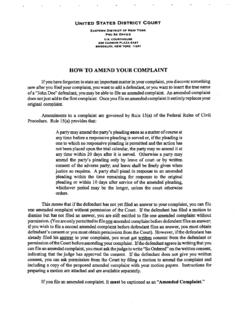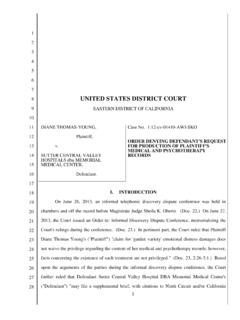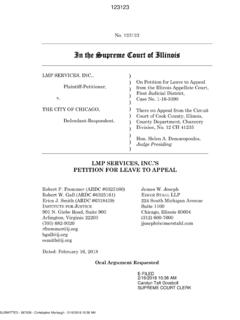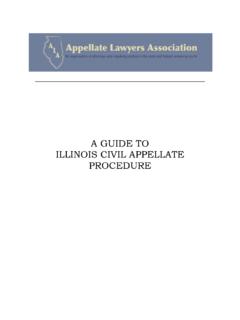Transcription of IN THE SUPREME COURT OF THE STATE OF ILLINOIS
1 Docket No. THESUPREME COURTOFTHE STATE OF ILLINOISMARK TURNER, Appellant, v. MEMORIAL MEDICAL CENTER, filed June 18, FREEMAN delivered the judgment of the COURT , Justice Fitzgerald and Justices Thomas, Kilbride, Garman,Karmeier, and Burke concurred in the judgment and , Mark Turner, brought a retaliatory discharge action inthe circuit COURT of Sangamon County against defendant, MemorialMedical Center (Memorial). The circuit COURT dismissed plaintiff sfirst-amended complaint pursuant to section 2 615 of the Code ofCivil Procedure (735 ILCS 5/2 615 (West 2006)). A divided panel ofthe appellate COURT upheld the dismissal. No. 4 07 0934 (unpublishedorder under SUPREME COURT Rule 23).
2 We allowed plaintiff s petitionfor leave to appeal (210 Ill. 2d R. 315(a)), and now affirm thejudgment of the appellate BACKGROUNDP laintiff s first-amended complaint alleged as follows. Plaintiffis a trained and licensed respiratory therapist. Beginning in 1983,plaintiff was employed by Memorial, which is a community his employment, plaintiff had consistently met legitimateemployment expectations, and his employment evaluationsconsistently indicated excellent work September 2006, the Joint Commission on Accreditation ofHealthcare Organizations (hereinafter, Joint Commission) performedan on-site survey at Memorial.
3 The Joint Commission is anindependent, not-for-profit organization that establishes varioushealth-care standards and evaluates an organization s compliancewith those standards and other accreditation requirements. Thepurpose of the on-site survey was to determine whether Memorialwould continue to receive Joint Commission s failure to receive this accreditation would result in theloss of federal Medicare/Medicaid uses a computer charting program that allows medicalprofessionals to electronically chart a patient s file. The JointCommission standard is that such electronic charting be performedimmediately after care is provided to a patient.
4 However, Memorial srespiratory therapy department did not require immediate , Memorial required a respiratory therapist to chart patient caremerely at some point during his or her September 28, 2006, plaintiff was asked to speak with a JointCommission surveyor. Also present at this meeting was Memorial svice-president of patient care services. During this meeting, plaintifftruthfully advised the surveyor of the discrepancy between the JointCommission standard of immediate charting and Memorial srequirement of charting at some point during the shift. Plaintifffurther advised the surveyor that Memorial s deviation from the JointCommission standard was jeopardizing patient safety.
5 Plaintiffalleged that as a result of his truthful statements to the JointCommission surveyor, Memorial discharged plaintiff on October 4, also alleged: ILLINOIS law clearly recognizes the rights ofpatients. The Medical Patient Rights Act [citation] recognizes ILLINOIS -3-public policy establishing [t]he right of each patient to careconsistent with sound nursing and medical practices. Plaintifffurther alleged that Memorial s failure to immediately chart patientrecords was not consistent with sound medical practices and jeopardized the safety of patients. According to the complaint,plaintiff s discharge violated public policy that encouragesemployees to report actions that jeopardize patient health and safety.
6 Plaintiff claimed damages in the form of lost Memorial s motion, the circuit COURT dismissed plaintiff scomplaint with prejudice pursuant to section 2 615 of the Code ofCivil Procedure (735 ILCS 5/2 615 (West 2006)). Viewing thealleged facts in the light most favorable to plaintiff, the COURT foundthat the complaint was legally insufficient. The COURT concludedplaintiff failed to establish the existence of a public policy that aprovision of law clearly mandated which Memorial allegedly violatedby discharging appellate COURT affirmed, with one justice speciallyconcurring. No. 4 07 0934 (unpublished order under SUPREME CourtRule 23).
7 This COURT allowed plaintiff s petition for leave to Ill. 2d R. 315(a). We subsequently granted the ILLINOIS TrialLawyers Association leave to submit an amicus curiae brief insupport of plaintiff. 155 Ill. 2d R. ANALYSISA section 2 615 motion to dismiss (735 ILCS 5/2 615 (West2006)) attacks the legal sufficiency of a complaint. The motion doesnot raise affirmative defenses, but rather alleges only defects on theface of the complaint. The question presented by a section 2 615motion to dismiss is whether the allegations of the complaint, whentaken as true and viewed in a light most favorable to the plaintiff, aresufficient to STATE a cause of action upon which relief can be cause of action will not be dismissed on the pleadings unless itclearly appears that no set of facts can be proved which will entitlethe plaintiff to recover.
8 Because ILLINOIS is a fact-pleading jurisdiction,a plaintiff must allege facts sufficient to bring his or her claim withinthe scope of the cause of action asserted. Napleton v. Village ofHinsdale, 229 Ill. 2d 296, 305 (2008); Vernon v. Schuster, 179 Ill. 2d-4-338, 344 (1997); Bryson v. News America Publications, Inc., 174 77, 86-87 (1996). A COURT reviews de novo an order granting asection 2 615 motion to dismiss. Napleton, 229 Ill. 2d at 305;Imperial Apparel, Ltd. v. Cosmo s Designer Direct, Inc., 227 Ill. 2d381, 392 (2008).In the present case, plaintiff assigns error to the circuit COURT sdismissal of his complaint with prejudice.
9 Plaintiff contends thatMemorial discharged him in retaliation for advising the JointCommission surveyor of the discrepancy between the JointCommission standard of charting a patient s file immediately aftercare is provided and Memorial s requirement of charting at somepoint during the employee s shift. Plaintiff alleged in the complaintthat his discharge violated public policy relating to patient health andsafety. Plaintiff contends that the complaint sufficiently states aclaim for retaliatory Common Law Retaliatory Discharge: Controlling PrinciplesIn ILLINOIS , a noncontracted employee is one who serves at theemployer s will, and the employer may discharge such an employeefor any reason or no reason.
10 Zimmerman v. Buchheit of Sparta, Inc.,164 Ill. 2d 29, 32 (1994); accord Fellhauer v. City of Geneva, 142 495, 505 (1991) (stating this COURT s adherence to rule thatemployer may discharge at-will employee for any or no reason); Pricev. Carmack Datsun, Inc., 109 Ill. 2d 65, 67 (1985) (stating acceptedgeneral rule that in an employment at will there is no limitation onthe right of an employer to discharge an employee ).However, an exception to this general rule of at-will employmentarises where there has been a retaliatory discharge of the , 109 Ill. 2d at 67. This COURT has recognized a limited andnarrow cause of action for the tort of retaliatory discharge.













